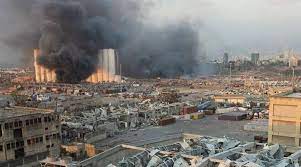New Rules For Ammonium Nitrate:

The Government has amended the rules for Ammonium Nitrate to curb its pilferage, introduce fire-fighting provisions as well as improve ways to handle and store the chemical.
- These rules have been amended from the lesson learnt from the Beirut Explosion in 2020. Nearly 3,000 tons of ammonium nitrate was stored at Beirut’s port for six years that detonated in 2020, wreaking death and destruction.
- The rules require that ammonium nitrate received at ports be transferred to storage houses 500 metres beyond the port area.
- The rules also permit the auction of seized lots of ammonium nitrate to ensure safe and speedy disposal besides requiring that Ammonium Nitrate be imported in bagged form only.
- The amendments include provision for adequate fire-fighting facilities in storage and handling areas, improvement of flooring in storage and handling areas.
- This will reduce the handling of loose chemicals at port and therefore enhance safety.
About Ammonium Nitrate:
- Ammonium Nitrate (NH4NO3) is a nitrogen-rich white, crystalline chemical which is soluble in water.
- It is a common chemical ingredient of agricultural fertilisers.
- It is used as an ingredient for the production of anaesthetic gases and cold packs.
- It is also the main ingredient in the manufacture of commercial explosives used in mining and construction.
- It is the main component of the explosive composition known as ANFO- Ammonium Nitrate Fuel Oil.
- Pure ammonium nitrate is not an explosive on its own. For Ammonium nitrate to be explosive, a primary explosive or detonator like RDX or TNT is required.
- Many Improvised Explosive Devices (IEDs) used by terrorists around the world have ANFO as the main explosive.
- Stored ammonium nitrate is a fire hazard and can explode in two ways.
- It may come in contact with some explosive mixture.
- Due to the oxidation process at large scale, heat may be generated starting a fire and then explosion. This seems to be the primary likely cause of the incident at Beirut port.




